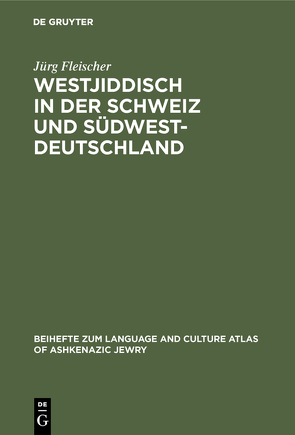In dieser Einführung werden zentrale Phänomene und Probleme der historischen Syntax des Deutschen behandelt. Da ältere Sprachstufen nur über schriftliche Dokumente zugänglich sind, kommen Fragen der Methodologie und der Interpretation von Quellen ausführlich zur Sprache. Den Kern bildet die Darstellung einzelner syntaktischer Entwicklungen (u.a. Kasussyntax, Kongruenz, Wortstellung). Ausführlich thematisiert wird auch die Erklärung syntaktischen Wandels, wobei externe Ansätze (Normierungen, Sprachkontakt) ebenso zu Wort kommen wie interne (funktionale und formale Erklärungen).
Aktualisiert: 2023-06-15
> findR *
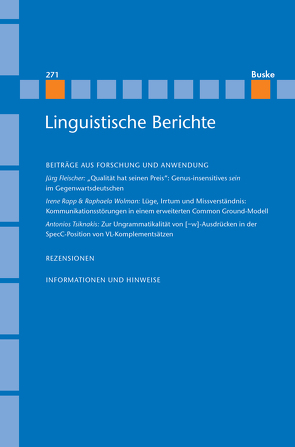
Beiträge aus Forschung und Anwendung
– Jürg Fleischer: „Qualität hat seinen Preis Preis“: Genus-insensitives 'sein' im Gegenwartsdeutschen.
Abstract: The German possessive 'sein' is usually classified as a pronoun of the 3rd person singular masculine and neuter. However, in the grammatical literature some descriptions of 'sein' instead of an expected 3rd person singular feminine possessive pronoun 'ihr' referring to feminine antecedents can be found. Based on search queries in the German Reference Corpus DeReKo it is shown that the phenomenon can be empirically established. While certain collocations displaying a high amount of neuter pronoun antecedents might be favorable for the use of 'sein' (alles [neuter] hat seinen Preis 'everything has its price' > Qualität [feminine] hat seinen Preis 'quality has its price'), it turns out that the semantics of the antecedent is decisive. In most examples, the feminine antecedent is an inanimate noun. This suggests that 'sein' is underlyingly unmarked with respect to gender, while the feminine 'ihr' is primarily a pronoun denoting female sex and only secondarily feminine gender.
– Irene Rapp & Raphaela Wolman: Lüge, Irrtum und Missverständnis: Kommunikation Missverständnis: Kommunikationsstörungen in einem erweiterten Common Ground Ground-Modell.
Abstract: In this paper we will argue that the analysis of lies, fallacies, and misunderstandings requires a complex model including a heterogeneous common ground based on reportative and situational evidence (cf. Farkas & Bruce 2010) and two additional layers, beliefs and objective facts. Lies can be defined by using the concept of reportative evidence, i. e. there is a contrast between an utterance and the utterer’s beliefs. Fallacies arise if a person is mistaken with regard to the situational evidence, i. e. there is a contrast between her beliefs and the objective facts. Misunderstandings, again, refer to reportative evidence, i. e. there is a contrast between the intended meaning of an utterance and the way it is understood by the hearer. Whereas the analysis of lies proves that the common ground is based on evidence and not on mutual belief, the analysis of fallacies and misunderstandings shows that both its situational and its reportative part have to split up into one part that is clearly fixed and another part that is open to interpretation and thus endangered by these communication failures.
– Antonios Tsiknakis: Zur Ungrammatikalität von [−w]-Ausdrücken in der SpecC-Position von VL-Komplementsätzen.
Abstract: This article addresses the impossibility of topicalization in verb final complement clauses in German. In the first part of the paper, existing research dealing with this phenomenon is discussed. Following this, an alternative approach is suggested which is embedded in a general theory of finite verb movement to the left periphery and topicalization in interrogative and declarative clause types. In a nutshell, it will be established that both syntactic processes are trig-gered by respective clause type features whose interpretation leads to an update of the question under discussion or the common ground of the context in prototypical utterance situations. Finally, the paper is concluded with the proposition to treat the feature triggering topicalization as a functor that modifies the interpretation of the feature which is triggering verb movement and therefore presupposes its presence for reasons of interpretability.
Rezensionen
– Melitta Gillmann: Narrog, Heiko & Bernd Heine (2018): Grammaticalization from a typological perspective.
– Jan Kerkmann: Schneider, Christian (2020): Der sprachlose Philosoph. Ludwig Wittgensteins Philosophie als lebensgeschichtliche Selbstreflexion.
Informationen und Hinweise
von Klaus Müllner und den Herausgeber*innen
Aktualisiert: 2023-06-16
> findR *
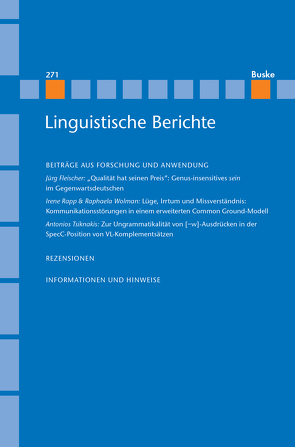
Beiträge aus Forschung und Anwendung
– Jürg Fleischer: „Qualität hat seinen Preis Preis“: Genus-insensitives 'sein' im Gegenwartsdeutschen.
Abstract: The German possessive 'sein' is usually classified as a pronoun of the 3rd person singular masculine and neuter. However, in the grammatical literature some descriptions of 'sein' instead of an expected 3rd person singular feminine possessive pronoun 'ihr' referring to feminine antecedents can be found. Based on search queries in the German Reference Corpus DeReKo it is shown that the phenomenon can be empirically established. While certain collocations displaying a high amount of neuter pronoun antecedents might be favorable for the use of 'sein' (alles [neuter] hat seinen Preis 'everything has its price' > Qualität [feminine] hat seinen Preis 'quality has its price'), it turns out that the semantics of the antecedent is decisive. In most examples, the feminine antecedent is an inanimate noun. This suggests that 'sein' is underlyingly unmarked with respect to gender, while the feminine 'ihr' is primarily a pronoun denoting female sex and only secondarily feminine gender.
– Irene Rapp & Raphaela Wolman: Lüge, Irrtum und Missverständnis: Kommunikation Missverständnis: Kommunikationsstörungen in einem erweiterten Common Ground Ground-Modell.
Abstract: In this paper we will argue that the analysis of lies, fallacies, and misunderstandings requires a complex model including a heterogeneous common ground based on reportative and situational evidence (cf. Farkas & Bruce 2010) and two additional layers, beliefs and objective facts. Lies can be defined by using the concept of reportative evidence, i. e. there is a contrast between an utterance and the utterer’s beliefs. Fallacies arise if a person is mistaken with regard to the situational evidence, i. e. there is a contrast between her beliefs and the objective facts. Misunderstandings, again, refer to reportative evidence, i. e. there is a contrast between the intended meaning of an utterance and the way it is understood by the hearer. Whereas the analysis of lies proves that the common ground is based on evidence and not on mutual belief, the analysis of fallacies and misunderstandings shows that both its situational and its reportative part have to split up into one part that is clearly fixed and another part that is open to interpretation and thus endangered by these communication failures.
– Antonios Tsiknakis: Zur Ungrammatikalität von [−w]-Ausdrücken in der SpecC-Position von VL-Komplementsätzen.
Abstract: This article addresses the impossibility of topicalization in verb final complement clauses in German. In the first part of the paper, existing research dealing with this phenomenon is discussed. Following this, an alternative approach is suggested which is embedded in a general theory of finite verb movement to the left periphery and topicalization in interrogative and declarative clause types. In a nutshell, it will be established that both syntactic processes are trig-gered by respective clause type features whose interpretation leads to an update of the question under discussion or the common ground of the context in prototypical utterance situations. Finally, the paper is concluded with the proposition to treat the feature triggering topicalization as a functor that modifies the interpretation of the feature which is triggering verb movement and therefore presupposes its presence for reasons of interpretability.
Rezensionen
– Melitta Gillmann: Narrog, Heiko & Bernd Heine (2018): Grammaticalization from a typological perspective.
– Jan Kerkmann: Schneider, Christian (2020): Der sprachlose Philosoph. Ludwig Wittgensteins Philosophie als lebensgeschichtliche Selbstreflexion.
Informationen und Hinweise
von Klaus Müllner und den Herausgeber*innen
Aktualisiert: 2023-06-13
> findR *
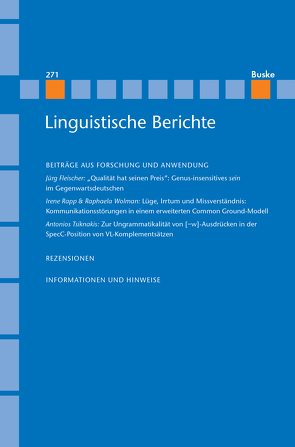
Beiträge aus Forschung und Anwendung
– Jürg Fleischer: „Qualität hat seinen Preis Preis“: Genus-insensitives 'sein' im Gegenwartsdeutschen.
Abstract: The German possessive 'sein' is usually classified as a pronoun of the 3rd person singular masculine and neuter. However, in the grammatical literature some descriptions of 'sein' instead of an expected 3rd person singular feminine possessive pronoun 'ihr' referring to feminine antecedents can be found. Based on search queries in the German Reference Corpus DeReKo it is shown that the phenomenon can be empirically established. While certain collocations displaying a high amount of neuter pronoun antecedents might be favorable for the use of 'sein' (alles [neuter] hat seinen Preis 'everything has its price' > Qualität [feminine] hat seinen Preis 'quality has its price'), it turns out that the semantics of the antecedent is decisive. In most examples, the feminine antecedent is an inanimate noun. This suggests that 'sein' is underlyingly unmarked with respect to gender, while the feminine 'ihr' is primarily a pronoun denoting female sex and only secondarily feminine gender.
– Irene Rapp & Raphaela Wolman: Lüge, Irrtum und Missverständnis: Kommunikation Missverständnis: Kommunikationsstörungen in einem erweiterten Common Ground Ground-Modell.
Abstract: In this paper we will argue that the analysis of lies, fallacies, and misunderstandings requires a complex model including a heterogeneous common ground based on reportative and situational evidence (cf. Farkas & Bruce 2010) and two additional layers, beliefs and objective facts. Lies can be defined by using the concept of reportative evidence, i. e. there is a contrast between an utterance and the utterer’s beliefs. Fallacies arise if a person is mistaken with regard to the situational evidence, i. e. there is a contrast between her beliefs and the objective facts. Misunderstandings, again, refer to reportative evidence, i. e. there is a contrast between the intended meaning of an utterance and the way it is understood by the hearer. Whereas the analysis of lies proves that the common ground is based on evidence and not on mutual belief, the analysis of fallacies and misunderstandings shows that both its situational and its reportative part have to split up into one part that is clearly fixed and another part that is open to interpretation and thus endangered by these communication failures.
– Antonios Tsiknakis: Zur Ungrammatikalität von [−w]-Ausdrücken in der SpecC-Position von VL-Komplementsätzen.
Abstract: This article addresses the impossibility of topicalization in verb final complement clauses in German. In the first part of the paper, existing research dealing with this phenomenon is discussed. Following this, an alternative approach is suggested which is embedded in a general theory of finite verb movement to the left periphery and topicalization in interrogative and declarative clause types. In a nutshell, it will be established that both syntactic processes are trig-gered by respective clause type features whose interpretation leads to an update of the question under discussion or the common ground of the context in prototypical utterance situations. Finally, the paper is concluded with the proposition to treat the feature triggering topicalization as a functor that modifies the interpretation of the feature which is triggering verb movement and therefore presupposes its presence for reasons of interpretability.
Rezensionen
– Melitta Gillmann: Narrog, Heiko & Bernd Heine (2018): Grammaticalization from a typological perspective.
– Jan Kerkmann: Schneider, Christian (2020): Der sprachlose Philosoph. Ludwig Wittgensteins Philosophie als lebensgeschichtliche Selbstreflexion.
Informationen und Hinweise
von Klaus Müllner und den Herausgeber*innen
Aktualisiert: 2023-06-08
> findR *
In dieser Einführung werden zentrale Phänomene und Probleme der historischen Syntax des Deutschen behandelt. Da ältere Sprachstufen nur über schriftliche Dokumente zugänglich sind, kommen Fragen der Methodologie und der Interpretation von Quellen ausführlich zur Sprache. Den Kern bildet die Darstellung einzelner syntaktischer Entwicklungen (u.a. Kasussyntax, Kongruenz, Wortstellung). Ausführlich thematisiert wird auch die Erklärung syntaktischen Wandels, wobei externe Ansätze (Normierungen, Sprachkontakt) ebenso zu Wort kommen wie interne (funktionale und formale Erklärungen).
Aktualisiert: 2023-06-05
> findR *
Die »Beihefte zum Language and Culture Atlas of Ashkenazic Jewry« ergänzen und unterstützen die LCAAJ-Publikationen theoretisch, methodologisch und materialiter. Die Beihefte präsentieren und analysieren jiddische Sprachdokumente unter linguistischen, kultur- und zeitgeschichtlichen Aspekten. Die Reihe gibt Studierenden einen Einblick in den Facettenreichtum des Jiddischen und stellt den Bezug zur internationalen Jiddistik her. Sie zeigt die Verflochtenheit der Jiddistik mit den benachbarten Disziplinen und bietet Material und Anregung nicht nur für Jiddisten, sondern auch für Germanisten, Slawisten, Religionswissenschaftler und Historiker.
Aktualisiert: 2023-05-29
> findR *
Die »Beihefte zum Language and Culture Atlas of Ashkenazic Jewry« ergänzen und unterstützen die LCAAJ-Publikationen theoretisch, methodologisch und materialiter. Die Beihefte präsentieren und analysieren jiddische Sprachdokumente unter linguistischen, kultur- und zeitgeschichtlichen Aspekten. Die Reihe gibt Studierenden einen Einblick in den Facettenreichtum des Jiddischen und stellt den Bezug zur internationalen Jiddistik her. Sie zeigt die Verflochtenheit der Jiddistik mit den benachbarten Disziplinen und bietet Material und Anregung nicht nur für Jiddisten, sondern auch für Germanisten, Slawisten, Religionswissenschaftler und Historiker.
Aktualisiert: 2023-05-29
> findR *
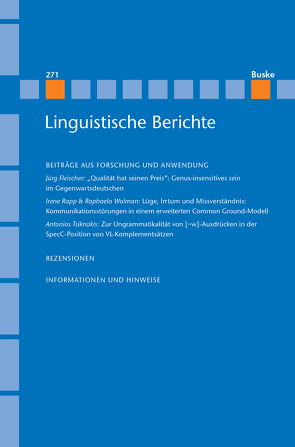
Beiträge aus Forschung und Anwendung
– Jürg Fleischer: „Qualität hat seinen Preis Preis“: Genus-insensitives 'sein' im Gegenwartsdeutschen.
Abstract: The German possessive 'sein' is usually classified as a pronoun of the 3rd person singular masculine and neuter. However, in the grammatical literature some descriptions of 'sein' instead of an expected 3rd person singular feminine possessive pronoun 'ihr' referring to feminine antecedents can be found. Based on search queries in the German Reference Corpus DeReKo it is shown that the phenomenon can be empirically established. While certain collocations displaying a high amount of neuter pronoun antecedents might be favorable for the use of 'sein' (alles [neuter] hat seinen Preis 'everything has its price' > Qualität [feminine] hat seinen Preis 'quality has its price'), it turns out that the semantics of the antecedent is decisive. In most examples, the feminine antecedent is an inanimate noun. This suggests that 'sein' is underlyingly unmarked with respect to gender, while the feminine 'ihr' is primarily a pronoun denoting female sex and only secondarily feminine gender.
– Irene Rapp & Raphaela Wolman: Lüge, Irrtum und Missverständnis: Kommunikation Missverständnis: Kommunikationsstörungen in einem erweiterten Common Ground Ground-Modell.
Abstract: In this paper we will argue that the analysis of lies, fallacies, and misunderstandings requires a complex model including a heterogeneous common ground based on reportative and situational evidence (cf. Farkas & Bruce 2010) and two additional layers, beliefs and objective facts. Lies can be defined by using the concept of reportative evidence, i. e. there is a contrast between an utterance and the utterer’s beliefs. Fallacies arise if a person is mistaken with regard to the situational evidence, i. e. there is a contrast between her beliefs and the objective facts. Misunderstandings, again, refer to reportative evidence, i. e. there is a contrast between the intended meaning of an utterance and the way it is understood by the hearer. Whereas the analysis of lies proves that the common ground is based on evidence and not on mutual belief, the analysis of fallacies and misunderstandings shows that both its situational and its reportative part have to split up into one part that is clearly fixed and another part that is open to interpretation and thus endangered by these communication failures.
– Antonios Tsiknakis: Zur Ungrammatikalität von [−w]-Ausdrücken in der SpecC-Position von VL-Komplementsätzen.
Abstract: This article addresses the impossibility of topicalization in verb final complement clauses in German. In the first part of the paper, existing research dealing with this phenomenon is discussed. Following this, an alternative approach is suggested which is embedded in a general theory of finite verb movement to the left periphery and topicalization in interrogative and declarative clause types. In a nutshell, it will be established that both syntactic processes are trig-gered by respective clause type features whose interpretation leads to an update of the question under discussion or the common ground of the context in prototypical utterance situations. Finally, the paper is concluded with the proposition to treat the feature triggering topicalization as a functor that modifies the interpretation of the feature which is triggering verb movement and therefore presupposes its presence for reasons of interpretability.
Rezensionen
– Melitta Gillmann: Narrog, Heiko & Bernd Heine (2018): Grammaticalization from a typological perspective.
– Jan Kerkmann: Schneider, Christian (2020): Der sprachlose Philosoph. Ludwig Wittgensteins Philosophie als lebensgeschichtliche Selbstreflexion.
Informationen und Hinweise
von Klaus Müllner und den Herausgeber*innen
Aktualisiert: 2023-05-26
> findR *
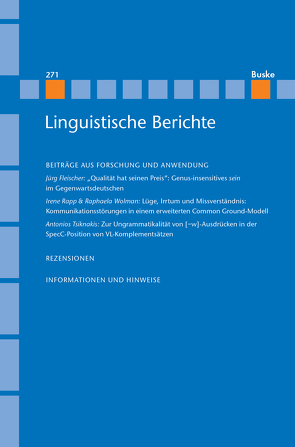
Beiträge aus Forschung und Anwendung
– Jürg Fleischer: „Qualität hat seinen Preis Preis“: Genus-insensitives 'sein' im Gegenwartsdeutschen.
Abstract: The German possessive 'sein' is usually classified as a pronoun of the 3rd person singular masculine and neuter. However, in the grammatical literature some descriptions of 'sein' instead of an expected 3rd person singular feminine possessive pronoun 'ihr' referring to feminine antecedents can be found. Based on search queries in the German Reference Corpus DeReKo it is shown that the phenomenon can be empirically established. While certain collocations displaying a high amount of neuter pronoun antecedents might be favorable for the use of 'sein' (alles [neuter] hat seinen Preis 'everything has its price' > Qualität [feminine] hat seinen Preis 'quality has its price'), it turns out that the semantics of the antecedent is decisive. In most examples, the feminine antecedent is an inanimate noun. This suggests that 'sein' is underlyingly unmarked with respect to gender, while the feminine 'ihr' is primarily a pronoun denoting female sex and only secondarily feminine gender.
– Irene Rapp & Raphaela Wolman: Lüge, Irrtum und Missverständnis: Kommunikation Missverständnis: Kommunikationsstörungen in einem erweiterten Common Ground Ground-Modell.
Abstract: In this paper we will argue that the analysis of lies, fallacies, and misunderstandings requires a complex model including a heterogeneous common ground based on reportative and situational evidence (cf. Farkas & Bruce 2010) and two additional layers, beliefs and objective facts. Lies can be defined by using the concept of reportative evidence, i. e. there is a contrast between an utterance and the utterer’s beliefs. Fallacies arise if a person is mistaken with regard to the situational evidence, i. e. there is a contrast between her beliefs and the objective facts. Misunderstandings, again, refer to reportative evidence, i. e. there is a contrast between the intended meaning of an utterance and the way it is understood by the hearer. Whereas the analysis of lies proves that the common ground is based on evidence and not on mutual belief, the analysis of fallacies and misunderstandings shows that both its situational and its reportative part have to split up into one part that is clearly fixed and another part that is open to interpretation and thus endangered by these communication failures.
– Antonios Tsiknakis: Zur Ungrammatikalität von [−w]-Ausdrücken in der SpecC-Position von VL-Komplementsätzen.
Abstract: This article addresses the impossibility of topicalization in verb final complement clauses in German. In the first part of the paper, existing research dealing with this phenomenon is discussed. Following this, an alternative approach is suggested which is embedded in a general theory of finite verb movement to the left periphery and topicalization in interrogative and declarative clause types. In a nutshell, it will be established that both syntactic processes are trig-gered by respective clause type features whose interpretation leads to an update of the question under discussion or the common ground of the context in prototypical utterance situations. Finally, the paper is concluded with the proposition to treat the feature triggering topicalization as a functor that modifies the interpretation of the feature which is triggering verb movement and therefore presupposes its presence for reasons of interpretability.
Rezensionen
– Melitta Gillmann: Narrog, Heiko & Bernd Heine (2018): Grammaticalization from a typological perspective.
– Jan Kerkmann: Schneider, Christian (2020): Der sprachlose Philosoph. Ludwig Wittgensteins Philosophie als lebensgeschichtliche Selbstreflexion.
Informationen und Hinweise
von Klaus Müllner und den Herausgeber*innen
Aktualisiert: 2023-05-23
> findR *
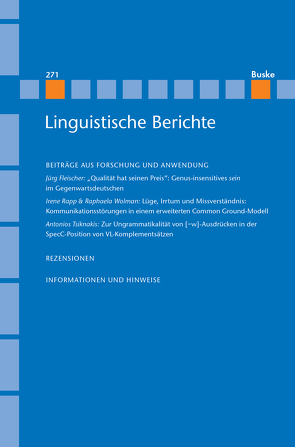
Beiträge aus Forschung und Anwendung
– Jürg Fleischer: „Qualität hat seinen Preis Preis“: Genus-insensitives 'sein' im Gegenwartsdeutschen.
Abstract: The German possessive 'sein' is usually classified as a pronoun of the 3rd person singular masculine and neuter. However, in the grammatical literature some descriptions of 'sein' instead of an expected 3rd person singular feminine possessive pronoun 'ihr' referring to feminine antecedents can be found. Based on search queries in the German Reference Corpus DeReKo it is shown that the phenomenon can be empirically established. While certain collocations displaying a high amount of neuter pronoun antecedents might be favorable for the use of 'sein' (alles [neuter] hat seinen Preis 'everything has its price' > Qualität [feminine] hat seinen Preis 'quality has its price'), it turns out that the semantics of the antecedent is decisive. In most examples, the feminine antecedent is an inanimate noun. This suggests that 'sein' is underlyingly unmarked with respect to gender, while the feminine 'ihr' is primarily a pronoun denoting female sex and only secondarily feminine gender.
– Irene Rapp & Raphaela Wolman: Lüge, Irrtum und Missverständnis: Kommunikation Missverständnis: Kommunikationsstörungen in einem erweiterten Common Ground Ground-Modell.
Abstract: In this paper we will argue that the analysis of lies, fallacies, and misunderstandings requires a complex model including a heterogeneous common ground based on reportative and situational evidence (cf. Farkas & Bruce 2010) and two additional layers, beliefs and objective facts. Lies can be defined by using the concept of reportative evidence, i. e. there is a contrast between an utterance and the utterer’s beliefs. Fallacies arise if a person is mistaken with regard to the situational evidence, i. e. there is a contrast between her beliefs and the objective facts. Misunderstandings, again, refer to reportative evidence, i. e. there is a contrast between the intended meaning of an utterance and the way it is understood by the hearer. Whereas the analysis of lies proves that the common ground is based on evidence and not on mutual belief, the analysis of fallacies and misunderstandings shows that both its situational and its reportative part have to split up into one part that is clearly fixed and another part that is open to interpretation and thus endangered by these communication failures.
– Antonios Tsiknakis: Zur Ungrammatikalität von [−w]-Ausdrücken in der SpecC-Position von VL-Komplementsätzen.
Abstract: This article addresses the impossibility of topicalization in verb final complement clauses in German. In the first part of the paper, existing research dealing with this phenomenon is discussed. Following this, an alternative approach is suggested which is embedded in a general theory of finite verb movement to the left periphery and topicalization in interrogative and declarative clause types. In a nutshell, it will be established that both syntactic processes are trig-gered by respective clause type features whose interpretation leads to an update of the question under discussion or the common ground of the context in prototypical utterance situations. Finally, the paper is concluded with the proposition to treat the feature triggering topicalization as a functor that modifies the interpretation of the feature which is triggering verb movement and therefore presupposes its presence for reasons of interpretability.
Rezensionen
– Melitta Gillmann: Narrog, Heiko & Bernd Heine (2018): Grammaticalization from a typological perspective.
– Jan Kerkmann: Schneider, Christian (2020): Der sprachlose Philosoph. Ludwig Wittgensteins Philosophie als lebensgeschichtliche Selbstreflexion.
Informationen und Hinweise
von Klaus Müllner und den Herausgeber*innen
Aktualisiert: 2023-05-22
> findR *

Beiträge aus Forschung und Anwendung
– Jürg Fleischer: „Qualität hat seinen Preis Preis“: Genus-insensitives 'sein' im Gegenwartsdeutschen.
Abstract: The German possessive 'sein' is usually classified as a pronoun of the 3rd person singular masculine and neuter. However, in the grammatical literature some descriptions of 'sein' instead of an expected 3rd person singular feminine possessive pronoun 'ihr' referring to feminine antecedents can be found. Based on search queries in the German Reference Corpus DeReKo it is shown that the phenomenon can be empirically established. While certain collocations displaying a high amount of neuter pronoun antecedents might be favorable for the use of 'sein' (alles [neuter] hat seinen Preis 'everything has its price' > Qualität [feminine] hat seinen Preis 'quality has its price'), it turns out that the semantics of the antecedent is decisive. In most examples, the feminine antecedent is an inanimate noun. This suggests that 'sein' is underlyingly unmarked with respect to gender, while the feminine 'ihr' is primarily a pronoun denoting female sex and only secondarily feminine gender.
– Irene Rapp & Raphaela Wolman: Lüge, Irrtum und Missverständnis: Kommunikation Missverständnis: Kommunikationsstörungen in einem erweiterten Common Ground Ground-Modell.
Abstract: In this paper we will argue that the analysis of lies, fallacies, and misunderstandings requires a complex model including a heterogeneous common ground based on reportative and situational evidence (cf. Farkas & Bruce 2010) and two additional layers, beliefs and objective facts. Lies can be defined by using the concept of reportative evidence, i. e. there is a contrast between an utterance and the utterer’s beliefs. Fallacies arise if a person is mistaken with regard to the situational evidence, i. e. there is a contrast between her beliefs and the objective facts. Misunderstandings, again, refer to reportative evidence, i. e. there is a contrast between the intended meaning of an utterance and the way it is understood by the hearer. Whereas the analysis of lies proves that the common ground is based on evidence and not on mutual belief, the analysis of fallacies and misunderstandings shows that both its situational and its reportative part have to split up into one part that is clearly fixed and another part that is open to interpretation and thus endangered by these communication failures.
– Antonios Tsiknakis: Zur Ungrammatikalität von [−w]-Ausdrücken in der SpecC-Position von VL-Komplementsätzen.
Abstract: This article addresses the impossibility of topicalization in verb final complement clauses in German. In the first part of the paper, existing research dealing with this phenomenon is discussed. Following this, an alternative approach is suggested which is embedded in a general theory of finite verb movement to the left periphery and topicalization in interrogative and declarative clause types. In a nutshell, it will be established that both syntactic processes are trig-gered by respective clause type features whose interpretation leads to an update of the question under discussion or the common ground of the context in prototypical utterance situations. Finally, the paper is concluded with the proposition to treat the feature triggering topicalization as a functor that modifies the interpretation of the feature which is triggering verb movement and therefore presupposes its presence for reasons of interpretability.
Rezensionen
– Melitta Gillmann: Narrog, Heiko & Bernd Heine (2018): Grammaticalization from a typological perspective.
– Jan Kerkmann: Schneider, Christian (2020): Der sprachlose Philosoph. Ludwig Wittgensteins Philosophie als lebensgeschichtliche Selbstreflexion.
Informationen und Hinweise
von Klaus Müllner und den Herausgeber*innen
Aktualisiert: 2023-05-20
> findR *
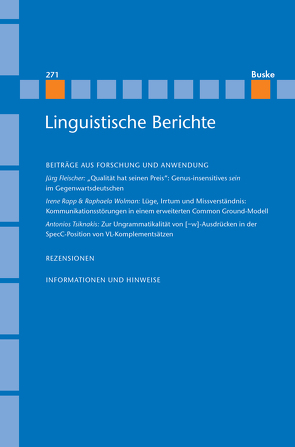
Beiträge aus Forschung und Anwendung
– Jürg Fleischer: „Qualität hat seinen Preis Preis“: Genus-insensitives 'sein' im Gegenwartsdeutschen.
Abstract: The German possessive 'sein' is usually classified as a pronoun of the 3rd person singular masculine and neuter. However, in the grammatical literature some descriptions of 'sein' instead of an expected 3rd person singular feminine possessive pronoun 'ihr' referring to feminine antecedents can be found. Based on search queries in the German Reference Corpus DeReKo it is shown that the phenomenon can be empirically established. While certain collocations displaying a high amount of neuter pronoun antecedents might be favorable for the use of 'sein' (alles [neuter] hat seinen Preis 'everything has its price' > Qualität [feminine] hat seinen Preis 'quality has its price'), it turns out that the semantics of the antecedent is decisive. In most examples, the feminine antecedent is an inanimate noun. This suggests that 'sein' is underlyingly unmarked with respect to gender, while the feminine 'ihr' is primarily a pronoun denoting female sex and only secondarily feminine gender.
– Irene Rapp & Raphaela Wolman: Lüge, Irrtum und Missverständnis: Kommunikation Missverständnis: Kommunikationsstörungen in einem erweiterten Common Ground Ground-Modell.
Abstract: In this paper we will argue that the analysis of lies, fallacies, and misunderstandings requires a complex model including a heterogeneous common ground based on reportative and situational evidence (cf. Farkas & Bruce 2010) and two additional layers, beliefs and objective facts. Lies can be defined by using the concept of reportative evidence, i. e. there is a contrast between an utterance and the utterer’s beliefs. Fallacies arise if a person is mistaken with regard to the situational evidence, i. e. there is a contrast between her beliefs and the objective facts. Misunderstandings, again, refer to reportative evidence, i. e. there is a contrast between the intended meaning of an utterance and the way it is understood by the hearer. Whereas the analysis of lies proves that the common ground is based on evidence and not on mutual belief, the analysis of fallacies and misunderstandings shows that both its situational and its reportative part have to split up into one part that is clearly fixed and another part that is open to interpretation and thus endangered by these communication failures.
– Antonios Tsiknakis: Zur Ungrammatikalität von [−w]-Ausdrücken in der SpecC-Position von VL-Komplementsätzen.
Abstract: This article addresses the impossibility of topicalization in verb final complement clauses in German. In the first part of the paper, existing research dealing with this phenomenon is discussed. Following this, an alternative approach is suggested which is embedded in a general theory of finite verb movement to the left periphery and topicalization in interrogative and declarative clause types. In a nutshell, it will be established that both syntactic processes are trig-gered by respective clause type features whose interpretation leads to an update of the question under discussion or the common ground of the context in prototypical utterance situations. Finally, the paper is concluded with the proposition to treat the feature triggering topicalization as a functor that modifies the interpretation of the feature which is triggering verb movement and therefore presupposes its presence for reasons of interpretability.
Rezensionen
– Melitta Gillmann: Narrog, Heiko & Bernd Heine (2018): Grammaticalization from a typological perspective.
– Jan Kerkmann: Schneider, Christian (2020): Der sprachlose Philosoph. Ludwig Wittgensteins Philosophie als lebensgeschichtliche Selbstreflexion.
Informationen und Hinweise
von Klaus Müllner und den Herausgeber*innen
Aktualisiert: 2023-05-18
> findR *
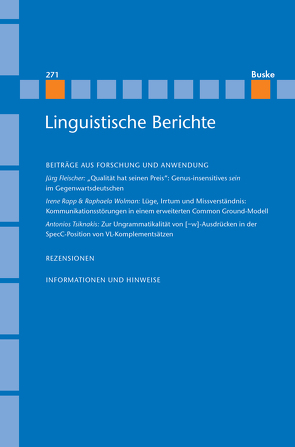
Beiträge aus Forschung und Anwendung
– Jürg Fleischer: „Qualität hat seinen Preis Preis“: Genus-insensitives 'sein' im Gegenwartsdeutschen.
Abstract: The German possessive 'sein' is usually classified as a pronoun of the 3rd person singular masculine and neuter. However, in the grammatical literature some descriptions of 'sein' instead of an expected 3rd person singular feminine possessive pronoun 'ihr' referring to feminine antecedents can be found. Based on search queries in the German Reference Corpus DeReKo it is shown that the phenomenon can be empirically established. While certain collocations displaying a high amount of neuter pronoun antecedents might be favorable for the use of 'sein' (alles [neuter] hat seinen Preis 'everything has its price' > Qualität [feminine] hat seinen Preis 'quality has its price'), it turns out that the semantics of the antecedent is decisive. In most examples, the feminine antecedent is an inanimate noun. This suggests that 'sein' is underlyingly unmarked with respect to gender, while the feminine 'ihr' is primarily a pronoun denoting female sex and only secondarily feminine gender.
– Irene Rapp & Raphaela Wolman: Lüge, Irrtum und Missverständnis: Kommunikation Missverständnis: Kommunikationsstörungen in einem erweiterten Common Ground Ground-Modell.
Abstract: In this paper we will argue that the analysis of lies, fallacies, and misunderstandings requires a complex model including a heterogeneous common ground based on reportative and situational evidence (cf. Farkas & Bruce 2010) and two additional layers, beliefs and objective facts. Lies can be defined by using the concept of reportative evidence, i. e. there is a contrast between an utterance and the utterer’s beliefs. Fallacies arise if a person is mistaken with regard to the situational evidence, i. e. there is a contrast between her beliefs and the objective facts. Misunderstandings, again, refer to reportative evidence, i. e. there is a contrast between the intended meaning of an utterance and the way it is understood by the hearer. Whereas the analysis of lies proves that the common ground is based on evidence and not on mutual belief, the analysis of fallacies and misunderstandings shows that both its situational and its reportative part have to split up into one part that is clearly fixed and another part that is open to interpretation and thus endangered by these communication failures.
– Antonios Tsiknakis: Zur Ungrammatikalität von [−w]-Ausdrücken in der SpecC-Position von VL-Komplementsätzen.
Abstract: This article addresses the impossibility of topicalization in verb final complement clauses in German. In the first part of the paper, existing research dealing with this phenomenon is discussed. Following this, an alternative approach is suggested which is embedded in a general theory of finite verb movement to the left periphery and topicalization in interrogative and declarative clause types. In a nutshell, it will be established that both syntactic processes are trig-gered by respective clause type features whose interpretation leads to an update of the question under discussion or the common ground of the context in prototypical utterance situations. Finally, the paper is concluded with the proposition to treat the feature triggering topicalization as a functor that modifies the interpretation of the feature which is triggering verb movement and therefore presupposes its presence for reasons of interpretability.
Rezensionen
– Melitta Gillmann: Narrog, Heiko & Bernd Heine (2018): Grammaticalization from a typological perspective.
– Jan Kerkmann: Schneider, Christian (2020): Der sprachlose Philosoph. Ludwig Wittgensteins Philosophie als lebensgeschichtliche Selbstreflexion.
Informationen und Hinweise
von Klaus Müllner und den Herausgeber*innen
Aktualisiert: 2023-05-12
> findR *
In dieser Einführung werden zentrale Phänomene und Probleme der historischen Syntax des Deutschen behandelt. Da ältere Sprachstufen nur über schriftliche Dokumente zugänglich sind, kommen Fragen der Methodologie und der Interpretation von Quellen ausführlich zur Sprache. Den Kern bildet die Darstellung einzelner syntaktischer Entwicklungen (u.a. Kasussyntax, Kongruenz, Wortstellung). Ausführlich thematisiert wird auch die Erklärung syntaktischen Wandels, wobei externe Ansätze (Normierungen, Sprachkontakt) ebenso zu Wort kommen wie interne (funktionale und formale Erklärungen).
Aktualisiert: 2023-05-08
> findR *
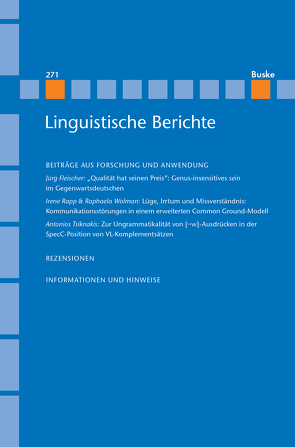
Beiträge aus Forschung und Anwendung
– Jürg Fleischer: „Qualität hat seinen Preis Preis“: Genus-insensitives 'sein' im Gegenwartsdeutschen.
Abstract: The German possessive 'sein' is usually classified as a pronoun of the 3rd person singular masculine and neuter. However, in the grammatical literature some descriptions of 'sein' instead of an expected 3rd person singular feminine possessive pronoun 'ihr' referring to feminine antecedents can be found. Based on search queries in the German Reference Corpus DeReKo it is shown that the phenomenon can be empirically established. While certain collocations displaying a high amount of neuter pronoun antecedents might be favorable for the use of 'sein' (alles [neuter] hat seinen Preis 'everything has its price' > Qualität [feminine] hat seinen Preis 'quality has its price'), it turns out that the semantics of the antecedent is decisive. In most examples, the feminine antecedent is an inanimate noun. This suggests that 'sein' is underlyingly unmarked with respect to gender, while the feminine 'ihr' is primarily a pronoun denoting female sex and only secondarily feminine gender.
– Irene Rapp & Raphaela Wolman: Lüge, Irrtum und Missverständnis: Kommunikation Missverständnis: Kommunikationsstörungen in einem erweiterten Common Ground Ground-Modell.
Abstract: In this paper we will argue that the analysis of lies, fallacies, and misunderstandings requires a complex model including a heterogeneous common ground based on reportative and situational evidence (cf. Farkas & Bruce 2010) and two additional layers, beliefs and objective facts. Lies can be defined by using the concept of reportative evidence, i. e. there is a contrast between an utterance and the utterer’s beliefs. Fallacies arise if a person is mistaken with regard to the situational evidence, i. e. there is a contrast between her beliefs and the objective facts. Misunderstandings, again, refer to reportative evidence, i. e. there is a contrast between the intended meaning of an utterance and the way it is understood by the hearer. Whereas the analysis of lies proves that the common ground is based on evidence and not on mutual belief, the analysis of fallacies and misunderstandings shows that both its situational and its reportative part have to split up into one part that is clearly fixed and another part that is open to interpretation and thus endangered by these communication failures.
– Antonios Tsiknakis: Zur Ungrammatikalität von [−w]-Ausdrücken in der SpecC-Position von VL-Komplementsätzen.
Abstract: This article addresses the impossibility of topicalization in verb final complement clauses in German. In the first part of the paper, existing research dealing with this phenomenon is discussed. Following this, an alternative approach is suggested which is embedded in a general theory of finite verb movement to the left periphery and topicalization in interrogative and declarative clause types. In a nutshell, it will be established that both syntactic processes are trig-gered by respective clause type features whose interpretation leads to an update of the question under discussion or the common ground of the context in prototypical utterance situations. Finally, the paper is concluded with the proposition to treat the feature triggering topicalization as a functor that modifies the interpretation of the feature which is triggering verb movement and therefore presupposes its presence for reasons of interpretability.
Rezensionen
– Melitta Gillmann: Narrog, Heiko & Bernd Heine (2018): Grammaticalization from a typological perspective.
– Jan Kerkmann: Schneider, Christian (2020): Der sprachlose Philosoph. Ludwig Wittgensteins Philosophie als lebensgeschichtliche Selbstreflexion.
Informationen und Hinweise
von Klaus Müllner und den Herausgeber*innen
Aktualisiert: 2023-04-26
> findR *
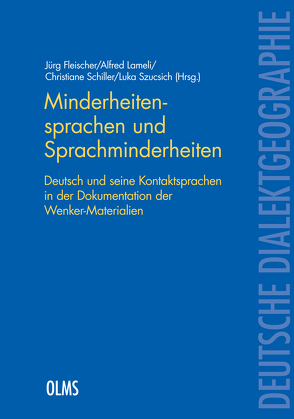
Georg Wenkers „Sprachatlas des Deutschen Reichs“ wird meist, einer national-philologischen Tradition folgend, nur in einer germanistischen Perspektive diskutiert. Dabei bleibt unbeachtet, dass es sich um einen multilingualen Sprachatlas handelt: Das gerade in seinen geographischen Randzonen mehrsprachige Deutsche Reich – auch Friesisch, Dänisch, Französisch, Litauisch, Nehrungskurisch, Sorbisch, Kaschubisch, Polnisch und Tschechisch prägten dort den sprachlichen Alltag – wurde durch Georg Wenkers flächendeckende Erhebungen zwischen 1879 und 1888 auch in Bezug auf dessen Vielfalt an Sprachen abgedeckt. In späteren Erhebungen kamen vor allem ab den 1920er Jahren weitere Sprachen hinzu, u. a. Niederländisch, Westfriesisch, Kroatisch, Slowenisch und Ungarisch.
Mit diesem Buch wird erstmals eine Zusammenschau der nicht-deutschen Wenkermaterialien geboten. Oft stellen diese Materialien die älteste verfügbare Quelle für die sprachlichen Verhältnisse heute nicht mehr existenter Sprachvarietäten dar. In diesem Buch analysieren Experten aller einschlägigen Philologien dieses auf Vergleichbarkeit angelegte Material und entwerfen damit ein neues Bild der europäischen Sprachgeographie.
Aktualisiert: 2020-10-31
> findR *
In dieser Einführung werden zentrale Phänomene und Probleme der historischen Syntax des Deutschen behandelt. Da ältere Sprachstufen nur über schriftliche Dokumente zugänglich sind, kommen Fragen der Methodologie und der Interpretation von Quellen ausführlich zur Sprache. Den Kern bildet die Darstellung einzelner syntaktischer Entwicklungen (u.a. Kasussyntax, Kongruenz, Wortstellung). Ausführlich thematisiert wird auch die Erklärung syntaktischen Wandels, wobei externe Ansätze (Normierungen, Sprachkontakt) ebenso zu Wort kommen wie interne (funktionale und formale Erklärungen).
Aktualisiert: 2020-10-09
> findR *
Die »Beihefte zum Language and Culture Atlas of Ashkenazic Jewry« ergänzen und unterstützen die LCAAJ-Publikationen theoretisch, methodologisch und materialiter. Die Beihefte präsentieren und analysieren jiddische Sprachdokumente unter linguistischen, kultur- und zeitgeschichtlichen Aspekten. Die Reihe gibt Studierenden einen Einblick in den Facettenreichtum des Jiddischen und stellt den Bezug zur internationalen Jiddistik her. Sie zeigt die Verflochtenheit der Jiddistik mit den benachbarten Disziplinen und bietet Material und Anregung nicht nur für Jiddisten, sondern auch für Germanisten, Slawisten, Religionswissenschaftler und Historiker.
Aktualisiert: 2023-03-27
> findR *
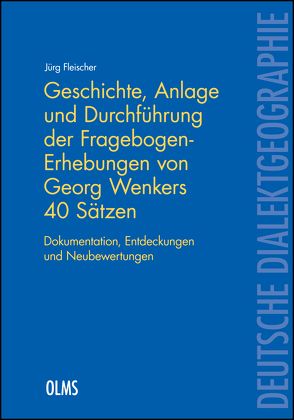
Georg Wenker und die nach ihm benannten 40 Sätze sind aus der germanistischen Dialektologie nicht wegzudenken. Per Fragebogen an den Volksschulen des damaligen Deutschen Reichs erhoben, wurde mit den 40 Sätzen eine weltweit einmalige empirische Basis geschaffen, die in späteren Erhebungen gezielt erweitert wurde. Jedoch sind viele Aspekte der unterschiedlichen Fragebogen-Erhebungen wenig bekannt, etwa nur schon die Tatsache, dass fast das gesamte kontinentalwestgermanische Gebiet abgedeckt ist.
Die vorliegende Monographie widmet sich dem primären Wenker-Material, d. h. den Fragebogen, die die Übersetzungen der 40 Sätze enthalten. Sie beleuchtet anhand bisher unveröffentlichter Dokumente die verschiedenen Erhebungen und zeigt Perspektiven auf, die in der bisherigen Literatur zu wenig oder keine Beachtung finden. So wurde in Wenkers Erhebungen (nicht aber in seinen Kartierungen) auch intralokale Variation systematisch abgedeckt und neben dem Deutschen wurden zahlreiche weitere Sprachen erfasst. Außerdem lässt sich zeigen, dass Wenker, der in der Literatur meist ausschließlich mit der indirekten Methode assoziiert wird, auch mit der direkten Erhebung experimentierte.
--STIMMEN ZUM BUCH--
"Fleischers detaillierte Rekonstruktion und Dokumentation der einzelnen Erhebungsrunden in den unterschiedlichen Regionen zeugen von gründlichen und umfassenden Recherchen zu vielen bis dato noch wenig bekannten Aspekten der Datenerhebung (…) Ebenso kann er schlüssig offenlegen, dass es zwischen den vier Erhebungen von Wenkers 40 Sätzen hinsichtlich der verwendeten Vorlage als auch der Methode Unterschiede gegeben hat. Für alle mit dem 'Sprachatlas des Deutschen Reichs" und dessen umfangreicher Datengrundlage Arbeitenden stellt das Werk wichtige und interessante Hintergrundinformationen zur Verfügung." (Brigitte Ganswindt, Germanistik, Band 60, Heft 1-2/2019)
Aktualisiert: 2022-04-06
> findR *
In dieser Einführung werden zentrale Phänomene und Probleme der historischen Syntax des Deutschen behandelt. Da ältere Sprachstufen nur über schriftliche Dokumente zugänglich sind, kommen Fragen der Methodologie und der Interpretation von Quellen ausführlich zur Sprache. Den Kern bildet die Darstellung einzelner syntaktischer Entwicklungen (u.a. Kasussyntax, Kongruenz, Wortstellung). Ausführlich thematisiert wird auch die Erklärung syntaktischen Wandels, wobei externe Ansätze (Normierungen, Sprachkontakt) ebenso zu Wort kommen wie interne (funktionale und formale Erklärungen).
Aktualisiert: 2023-03-04
> findR *
MEHR ANZEIGEN
Bücher von Fleischer, Jürg
Sie suchen ein Buch oder Publikation vonFleischer, Jürg ? Bei Buch findr finden Sie alle Bücher Fleischer, Jürg.
Entdecken Sie neue Bücher oder Klassiker für Sie selbst oder zum Verschenken. Buch findr hat zahlreiche Bücher
von Fleischer, Jürg im Sortiment. Nehmen Sie sich Zeit zum Stöbern und finden Sie das passende Buch oder die
Publiketion für Ihr Lesevergnügen oder Ihr Interessensgebiet. Stöbern Sie durch unser Angebot und finden Sie aus
unserer großen Auswahl das Buch, das Ihnen zusagt. Bei Buch findr finden Sie Romane, Ratgeber, wissenschaftliche und
populärwissenschaftliche Bücher uvm. Bestellen Sie Ihr Buch zu Ihrem Thema einfach online und lassen Sie es sich
bequem nach Hause schicken. Wir wünschen Ihnen schöne und entspannte Lesemomente mit Ihrem Buch
von Fleischer, Jürg .
Fleischer, Jürg - Große Auswahl an Publikationen bei Buch findr
Bei uns finden Sie Bücher aller beliebter Autoren, Neuerscheinungen, Bestseller genauso wie alte Schätze. Bücher
von Fleischer, Jürg die Ihre Fantasie anregen und Bücher, die Sie weiterbilden und Ihnen wissenschaftliche Fakten
vermitteln. Ganz nach Ihrem Geschmack ist das passende Buch für Sie dabei. Finden Sie eine große Auswahl Bücher
verschiedenster Genres, Verlage, Schlagworte Genre bei Buchfindr:
Unser Repertoire umfasst Bücher von
- Fleischfresser, Andreas
- Fleischfresser, Luisa
- Fleischhack, Christian
- Fleischhack, Erich
- Fleischhack, Ernst
- Fleischhack, Julia
- Fleischhack, Maria
- Fleischhacker, Christina
- Fleischhacker, Franz X.
- Fleischhacker, Gerald
Sie haben viele Möglichkeiten bei Buch findr die passenden Bücher für Ihr Lesevergnügen zu entdecken. Nutzen Sie
unsere Suchfunktionen, um zu stöbern und für Sie interessante Bücher in den unterschiedlichen Genres und Kategorien
zu finden. Neben Büchern von Fleischer, Jürg und Büchern aus verschiedenen Kategorien finden Sie schnell und
einfach auch eine Auflistung thematisch passender Publikationen. Probieren Sie es aus, legen Sie jetzt los! Ihrem
Lesevergnügen steht nichts im Wege. Nutzen Sie die Vorteile Ihre Bücher online zu kaufen und bekommen Sie die
bestellten Bücher schnell und bequem zugestellt. Nehmen Sie sich die Zeit, online die Bücher Ihrer Wahl anzulesen,
Buchempfehlungen und Rezensionen zu studieren, Informationen zu Autoren zu lesen. Viel Spaß beim Lesen wünscht Ihnen
das Team von Buchfindr.





